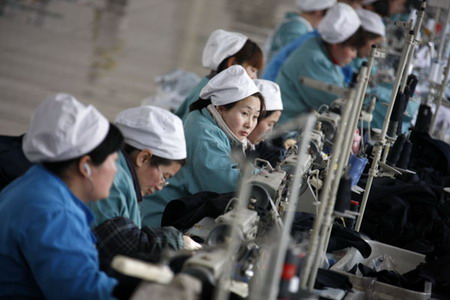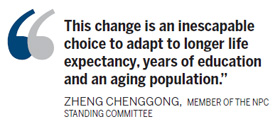Photos
Debate works up retirement policy
Updated: 2011-03-16 09:40
By Zhou Wenting (China Daily)
|
 |
|
Women produce clothes exported to Southeast Asian countries at a factory in Huaibei city, Anhui province. Some experts and officials consider the possible change in retirement age as a way to improve the rights of women, who retire five or 10 years earlier than men under current policy. [Photo / China Daily] |
"My work is really tiring," said Xu, a police officer in Guangzhou who worked around the clock in the latter half of 2010 on security for the Asian Games. "I also have to take care of my husband and two children, so I don't want to work any extra years."

Delayed retirement became a hot topic after Wang Xiaochu, vice-minister of human resources, said in September that the ministry was considering the idea. He made the remarks at a news conference and said any decision would depend on China's population and employment outlook.
The issue was discussed recently during interviews with delegates to the just-concluded annual sessions of the National People's Congress (NPC) and the Chinese People's Political Consultative Conference (CPPCC) National Committee.
What would delaying retirement mean in China? Proponents believe it is necessary because of the aging population and will benefit women, who retire five or 10 years before men. Opponents fear it would aggravate employment difficulties and widen the rich-poor divide.
China's retirement policy dates to 1951, when the central government set 60 as the retirement age for men and 50 for women. Modifications made in 1955 declared that men would retire at 60, female public servants at 55 and other women in the work force at 50. A 1978 document carried on those modifications, and they stand today.
But people live much longer now. Life expectancy at birth was just 46 years in 1950 and hit 73 two years ago, according to the National Bureau of Statistics.
As a result, it is reasonable to increase retirement age to 63-65 for women and men, said Hu Angang, director of the Tsinghua University's research center for contemporary China in Beijing. Not all experts agree.
|
||||
More than 200 scholars and officials participated in study and discussion for the book, and more than 30 experts cooperated in writing different chapters.
One of them is Mu Huaizhong, vice-chancellor of Liaoning University and director of the university's population research institute. Mu cited labor force structure as a principle reason to support postponed retirement.
According to the 2009 Statistical Communique of China's Aging Development, the most recent data available, people 60 and older make up 12.5 percent of China's population. In 2030, they will be one-fourth of the total.
Taxes from slightly more than three working people support each pensioner now, according to the 2009 White Book of China's Manpower Resource. In 2035, only two workers will provide that support.According to Mu's calculation, the size of China's work force will begin to decline in 2013. The ratio of workers to retirees already has dropped from 10-to-1 in 1982 to 3.5-to-1 in 2002.
"Can a young working force, which is much smaller in size due to the one-child policy, afford the pensions for the Chinese baby boomers?" Mu asked. The baby boom in China covers those born from the 1950s through the 1970s.
Critics said it's up to the government to provide for the aged. But Hu Xingdou, a professor of economics at the Beijing Institute of Technology, said China's input in pensions has long been insufficient.
"The country's social security fund accounts for 6 percent of gross domestic product, while the figure is 40 percent in developed countries," Hu said.
Tang Jun, deputy director of Chinese Academy of Social Sciences' research center of social policy, said it's not a simple act of collecting money and giving it out.
"Pension relates to a country's economic situation," Tang said. "If the money is invested properly, good profit will keep the pension alive."
Specials

Earthquake Hits Japan
A massive 8.8 magnitude quake hit the northeast coast of Japan on March 11,2011.

NPC & CPPCC sessions
Lawmakers and political advisers gather in Beijing to discuss major issues.

Pictures: quake aftermath
A massive earthquake hit Japan hard, leaving thousands dead.



